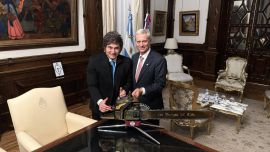What’s it like representing the Southern Cone and not just Argentina?
Yes, I’m the Executive Director for the Southern Cone at the IMF. The Fund has 24 boards, some single-member and others multi-member. Single-member means the post being handled by one country, multi-member shared jurisdiction.
In our case Southern Cone means six countries: Argentina, Chile, Paraguay, Peru, Uruguay and Bolivia. That means you are proposed by Argentina but the assembly names you and on that basis you are a member of the board, as well as an IMF employee.
Strictly speaking, any director of a company has some conflict of interests between the shareholder who proposed him and that company. There is a legal debate as to whom the directors should respond. The interests are not always the same, there is tension.
But are you representing the Southern Cone countries at the IMF or vice-versa?
I’m quite clear as to the interests I represent and defend.
When the agreement was reached with the private foreign creditors, you said: “We felt relief but it’s just one more link in a chain of solutions to the problems,” adding: “The solution to paying our debt has neither begun nor ended with the huge step we took today.” Were the expectations as to that first step exaggerated?
When this government took over, we found that the previous government had defaulted on its own debt issued in pesos, something no country has done. You might have balance of payments difficulties with your external debt but you never default on internal debt.
If countries issue debt in their own currency, isn’t it impossible to default on it?
I don’t know how many antecedents there are beyond Argentina 2019. Part of the way out is to reconstruct the capacity to incur debt with the state’s own currency – it helps the institutional investment markets because it needs performing instruments to generate a horizon, a reference for the private sector. Reconstructing peso debt was a most important and primordial instrument. It’s not the same to issue debt in dollars as in pesos. Sometimes we Argentines have those euphoric moments when we think they’re the same but they’re not, whether we’re euphoric or depressed.
That first step was fundamental, one of the central elements of this administration. The recovery of the peso curve in combination with lowering the astronomic interest rates with which we kicked off has been a remarkable success. The idea was that a global or universal regularisation of Argentina’s financial problems could be reached by starting with its own debt and then moving onto the foreign currency component, subdivided into international and domestic markets. Following this line is where the multilateral organisms and especially the problem with the IMF crop up.
When I highlighted that we had not even begun, it was because we were regularising the curve in pesos and had not finished there. We were finishing up the local bond swap and afterwards comes this IMF chapter. It was a link in a more generalised process of reconstituting Argentine debt markets. You first have to recover growth in order to service debt, that’s why I spoke of a link.
So are we now embarked on a definite process of resolution?
A definite process passes by Argentina’s viability as a country to generate its own resources, to export and grow, that’s viability.
So even if agreement with the IMF were reached, we wouldn’t be resolving the problem?
We will have resolved one part of the problem which will permit us to continue resolving others. But Argentina has no dimension of its future in its present and perhaps that’s what the grieta rift is all about. Over and above the ideological or philosophical postures, any country has a dimension of the future, discussing how to plan it in the present. We lack that in Argentina. We think that everything is two-dimensional. Everything consists of what happens within the cycle, what will happen tomorrow and how you solve it. People think that if you solve that problem, you’ve solved everything – you either solve it or you don’t. So everything becomes binary. You have to understand things as links. These dynamics of always bringing the whole universe into the present breed frustrations and errors.
The lack of a future makes the present more difficult.
It exacerbates tensions and makes a common horizon harder.
Regarding the agreement with the IMF, you said: “The programme will be ours, not theirs.” How does that work?
We’re in the initial phase of discussions. This week’s mission was the first exploratory stage to understand the restrictions and Argentine reality better. That is where the political definition of President Alberto Fernández is important. We want this debated in Congress. This is a bid to incorporate the dimension of the future into the present. IMF positions should never be a cyclical problem for rapid resolution by the government, turning its back on society, that’s not going to work. It can only work when discussed in its natural sphere of Congress and with the greatest social participation possible.
Does the opposition possibly being the government in the future also form part of the discussion?
But it’s not just a question of transforming the opposition into an accomplice. It’s part of making a joint future visible and viable.
The stand-by agreement originally signed with the IMF by the Mauricio Macri government was US$57 billion although less money entered the country. You said: “Now we have to ask for money from the IMF to pay the IMF.” Wouldn’t it have been better to collect the complete US$57 billion and leave more reserves?
No. Firstly because that would have had to be within the framework of the agreement which went off the rails in 2018. That was the framework in force so we would have had to commit ourselves to a programme which wasn’t working. First that programme had to be replaced by a new one.
Does the possibility of asking the Fund for more money exist?
Not in reference to the previous programme. It could happen if identified as necessary in relation to the programme to come. The previous programme is cancelled. That’s not our intention, as the minister and president have said on repeated occasions. Our intention is to ask for financing from the Fund in order to leave it. We understand that as part of the problem and of the solution, give or take cyclical factors. In February the debt was determined to be unsustainable so that was already not an option then. When we cancelled, those funds were already no longer available.
You said: “The IMF is not a development bank and never will be. We all know that [its money] comes with conditions and we’ll try to avoid those conditions damaging Argentines.” Where would the greatest damage lie?
We need to look after the conditions necessary for recovery. Not all countries are the same. For some years multilateral organisations have had the mantra: “No size fits all,” often repeated, but it must be practised. Argentina is a bimonetary country unlike almost any other and 80 percent of its Gross Domestic Product is the consumer market. It is a country with important problems of formation of external assets, including capital flight and tax evasion. It has particular features which other countries do not have and the measures to be formulated must be related to that. Applying the textbook without looking leads to what we have – record monetary shrinkage with record inflation. That doesn’t happen anywhere else.
IMF ignorance?
It was a problem of diagnosis by both Argentina and the IMF, as they were then.
What implications does geopolitics have in the functioning and role of the IMF?
The IMF has a dual role, protagonist and instrument at the same time. It is a tool of the shareholders who have the most influence. There are courses of action where the interests overlap but others where they don’t. The IMF protagonist runs into some kind of friction with the IMF instrument with more or less contrast.
Would anything change if Donald Trump loses his re-election bid?
I don’t know. I don’t like speculating about those elections, which are cyclical. This is more a question of medium-term and long-range global trends. In the midst of a pandemic there is an incremental power like China and there is a global debt crisis which involves splitting the losses between París Club countries, the private sector, China, the multilateral organisations and developing countries indebted in a way they weren’t before. José Ortega y Gasset said that a man is a man and his circumstances. Institutions are the same, themselves and their circumstances.
¿Circumstances which would be modified if Trump were not re-elected?
I wouldn’t focus on that. That circumstance seems to me more determinant for the institutional corporate ethos. Kristalina Georgieva makes a lot of reference to having to find extraordinary solutions. Without these circumstances, she wouldn’t be recommending maximum fiscal and monetary efforts to the world to contain the pandemic.
Are decisions taken by a president of the United States important for the IMF?
Possibly, yes. But I don’t know how important the new cosmic vision and configuration of the IMF is for that US agenda.
Isn’t there something self-complacent about the idea that there is now a good IMF?
I don’t believe in a good IMF as a concept. I believe in ontology more than kindness and in the organic more than the dogmatic. But it does seem to me an unprecedented situatión.
An IMF with constraints?
We’re both constrained by a common problem.
But the Fund was never constrained before.
Not as much as now. But that’s not just Argentina. All the global circumstances influence. But I’d say that more than constrained, it’s obliged to think “outside the box”.
How should the new programme be ideally?
A programme which profoundly understands what Argentina can and cannot tolerate is needed. There is a very important antecedent – the IMF’s role in the negotiation with the private creditors, above all the technical assistance and the pre-pandemic debt sustainability analysis. The pandemic aggravated or underlined the situation, marking out Argentina’s possible debt ceiling. That generated an important reaction in some bondholders, who were highly aggrieved.
Isn’t the expression “servicing the debt” financial fiction? Do you service the debt or just the interest? Are there any countries which pay their debts out of their fiscal surpluses?
Now there’s an exciting subject. I once debated whether Finance is taught in the right place, wondering whether it should not be studied in Political Science because its dynamics follow power more than the economy.
This has many aspects, it seems to me. To try and take it to a terrain which we can grasp: financial products have passed from approximately 100 percent of gross world output to 500 percent so that the prevalence of finances over the global economy has produced a very marked primus inter pares. At the same time, along with that excess liquidity, the issue of where to place it and where it goes, there appears the discussion of interest rates, which is the issue, not the capital. Something which may be perceived in diverse circumstances – for example, the negative interest rates among many central countries, including countries with massive fiscal deficits, with debts over 100 percent of their Gross Domestic Products. That is something which does not necessarily have a financial logic but of another kind. In some sense having negative interest rates in those countries is almost as if they were restructuring permanently.
In Argentina’s case, the focus on the discussion of the dynamics of the debt and its restructuring has obliged us to discuss discounting interest rates. It was very brutal. When discussing interest rates and coupons, not just interest as such is debated but what should be the discounting rate and risk. In 2005 we discussed whether the capital haircut was what it ought to be. It was a discussion about something objective. When the discussion is about interest rates, it is very difficult to agree, even as to what are the facts.
How do you define economic development? Is it the distribution of wealth and the sustainability of growth?
It’s harmonic growth, having the capacity to develop productive forces, it’s added value and the possibility of an inclusive economy for the entire population. Some sectors will be more competitive and dynamic, others less so but on aggregate society will be able to include its different sectors.
What is your vision of the role of the state?
It is important to bring order and even more so in a country like Argentina. Since there is no dimension of the future in the present, the tussle to distribute what there is becomes exacerbated. The importance of the state thus becomes all the greater to bring order and a joint vision over those of the sectors.
The only sure thing in the future is the state.
What I’m saying is that the state has the big picture of the whole. It’s important that society in its entirety incorporates the idea of the future into the present.
You participated in the Vatican encounter last February together with Pope Francis, Kristalina Georgieva, Joseph Stiglitz, Jeffrey Sachs and various finance ministers from all over the world, discussing the evolution of the global economy and an increasingly financial capitalism.
It is necessary to generate a coalition aware of the magnitude of the problems, which are aggravated by the search for a solution. We must be aware of the urgency of awareness. I stay with that, the sense of urgency. During those days there were moments in which I was impressed by the quantity of people who had met and the dimensions of the reality of the problem.
At that time the potential of coronavirus was still not known.
That’s true. But that meeting and that new form of solidarity could be seen in Kristalina’s response to the pandemic and her positions on it. The idea of extraordinary solutions for extraordinary problems. Understanding just how much inequality was going to be exacerbated and how destabilising that inequality is.
How has the advance of coronavirus modified the global economy?
We still don’t know, we have to wait and be ready to recover. We’re in the middle of the whirlwind of its effects. We must wait several years before we finally understand. We are quite clearly heading towards a more unequal world, between countries and within countries.
A worse world?
Much worse. Inequality breeds instability and furthermore less growth and less potential for growth. The mechanisms for coordinating policies and the forums for solving problems are also in tension.
You were saying that finance should also be taught to political scientists. Will the tensions in the world modifying finances arise from politics?
We do not know. We can formulate hypotheses as to what is necessary but we do not know how it will end.

















Comments